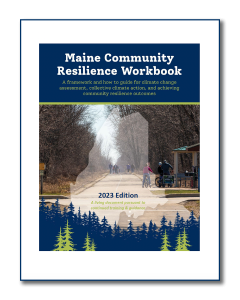Foreword and Acknowledgment
 Communities across Maine are already adapting to climate change. Collectively we are learning how to respond to these changes – intensifying storm patterns, warmer weather and waters, species shifts, ticks, pollen, and summer droughts. Municipalities, Wabanaki Tribal Nations, businesses, and homeowners are making plans, investing in infrastructure, and making operational changes to keep people safe, keep communities vibrant, and build their resilience.
Communities across Maine are already adapting to climate change. Collectively we are learning how to respond to these changes – intensifying storm patterns, warmer weather and waters, species shifts, ticks, pollen, and summer droughts. Municipalities, Wabanaki Tribal Nations, businesses, and homeowners are making plans, investing in infrastructure, and making operational changes to keep people safe, keep communities vibrant, and build their resilience.
The workbook is intended for municipalities and service providers working with communities for climate change and climate change-related projects.1 However, whole community climate action has always been driven by a variety of different community members and active stakeholders and businesses, so the concepts and resources in the workbook may be of equal use for others to draw on.
There is no need to reinvent the wheel. We can expedite climate solutions in Maine by communicating what we already know is working and by learning together. This workbook assists in the efficacy of people, communities, and networks in Maine that are taking climate actions and supports timely information sharing across those actors.
The 2023 Edition of the Community Resilience Workbook was compiled during a transformative time for climate action in Maine. Best practices for climate resilience and Maine’s specific landscape of climate preparedness activities are inherently evolving. So too will future versions of this resource expand and refine guidance for climate action. Sustained commitment and innovation are thus needed to ensure that this resource continues to foster meaningful outcomes for communities across Maine. We thank, in advance, the future contributors and participants who will steward the journey.
Acknowledgment
The 2023 edition would not be possible without many authors and advisory contributors who provided topical expertise and galvanized the energy for this important milestone of publication.
A special acknowledgment is included for the funders and drivers behind this project, the Governor’s Office of Policy Innovation and the Future, The Nature Conservancy in Maine, the Senator George J. Mitchell Center for Sustainability Solutions at the University of Maine, the Maine Department of Environmental Protection, the Maine Department of Agriculture, Conservation and Forestry, Maine Sea Grant, and the Maine Climate Science Information Exchange. This resource connects with the ongoing efforts of the Maine Climate Council (MCC) to understand and support resilience-related needs within Maine’s communities. The Mitchell Center has been working with MCC representatives to provide recommendations to strengthen the MCC’s equity commitments and collaborative approaches to build capacities for climate adaptation, especially for diverse and underserved communities. The Mitchell Center’s first report, Assessing the Potential Equity Outcomes of Maine’s Climate Action Plan: Framework, Analysis, and Recommendations, served as a foundation for sections of the Community Resilience Workbook.
Dr. Bridie McGreavy, Dr. Adam Daigneault, and Joey Reed at the University of Maine were integral in developing climate adaptation metrics and outcomes and a resilience assessment framework. These initial steps evolved into a broader and more collaborative project following extensive stakeholder outreach and review in the summer of 2021. In September of 2021, this core team expanded to include Jessica Gribbon Joyce of Tidal Bay Consulting, to adapt the deliverables to integrate the stakeholder feedback and coordinate early drafts of the workbook. Nathan Robbins from the Maine Department of Environmental Protection, Dr. Parker Gassett from the Maine Climate Science Information Exchange and Maine Sea Grant, and Esperanza Stancioff from Maine Sea Grant and UMaine Cooperative Extension Office joined the core team to connect this work with Maine’s broader community of practice for climate change preparedness and the Climate Change Adaptation Providers Network. Samantha Horn, Jeremy Bell, Judy East, and Brian Ambrette provided valuable leadership in situating this work to align with broader resilience initiatives. Nathan Robbins and Parker Gassett served as principal coordinators throughout 2022 leading to the 2023 edition of the Maine Community Resilience Workbook.
Many individuals generously provided input as reviewers, authors or advisory contributors to outline development, specific content revisions, outreach and testing, some of whom are recognized below:
Abbie Sherwin
Abby Roche
Adam Daigneault
Alex Redfield
Allen Kratz
Ashley Hodge
Annie Cox
Atticus Carnell
Brian Ambrette
Bridie McGreavey
Charlie Colgan
Chloe Shields
Chris Feurt
Christi Chapman-Mitchell
Cody Obropta
Corinne Michaud-LeBlanc
Dave Low
David Ludwig
Don Mansius
Eileen Johnson
Emily Farr
Esperanza Stancioff
Evan Richert
Gabe McPhail
Gayle Bowness
Gwen Hilton
Heather Leslie
Ivan Fernandez
Jason Anderson
Jan Santerre
Jay Kamm
Jessica Brunacini
Jeff Dennis
Jennifer Page
Jeremy Bell
Jeremy Gabrielson
Jessica Gribbon
Joyce Jessica Scott
Joey Reed
Josh Stoll
Judy East
Julie Rosenbach
Kate Dufor
Kate Tagai
Kathleen Leyden
Karina Graeter
Kendra Jo Grindle
Kohl Kanwit
Kristen Puryear
Laura Shields-Haas
Lisa St. Hilaire
Liz Hertz
Mark Hedrick
Martha Sheils
Meghan Grabill
Michelle de Leon
Molly Docherty
Nathan Robbins
Page Nichols
Parker Gassett
Pat Saunders
Peter Slovinsky
Paul Anderson
Rebecca Lincoln
Rick Wilson
Ruth Indrick
Sam Roy
Samantha Horn
Sara Mills-Knapp
Shri Verrill
Slade Moore
Steve Dickson
Steve Walker
Susan Breau
Susie Arnold
Suzanne MacDonald
Tom Gordon
Troy Moon
1 We intend to connect this workbook with Wabanaki Tribal Nations, including the Penobscot Nation, the Passamaquoddy Tribes, the Houlton Band of Maliseet Indians, and the Mi’kmaq Nation, and related efforts through the Maine Climate Council to better understand how this resource or a related effort could support Wabanaki climate justice, climate adaptation, and Tribal sovereignty. While we hope that the content in this workbook will be relevant to Tribal audiences, we do not assume that it will be and recognize there is more work to be done to center Wabanaki perspectives and connect across Maine and Wabanaki climate adaptation efforts.
